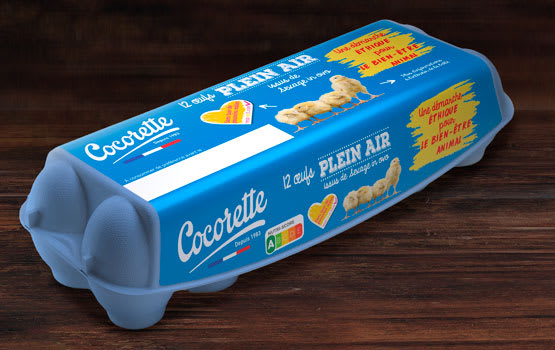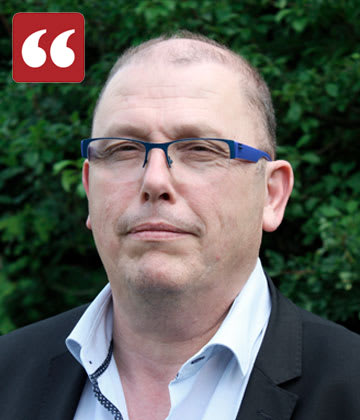- 2-2021 Cocorette
- 2-2021 Cocorette
First national brand to say “Non!” to chick killing
Although the French government have not yet followed Germany’s lead in drafting a ban on chick culling, Cocorette free range and organic eggs – which are all produced without a single male chick being killed - have been sold across France since Summer 2020.
To send a clear signal for more animal welfare, it was crucial for them to reflect their sustainable principles in their packaging. So they made the decision to package all their eggs in Hartmann’s 10-egg and 12-egg imagic2® moulded fibre carton.
Mutual respeggt
To improve animal welfare standards in all its products, Cocorette Group has been collaborating with respeggt group from Germany.
respeggt group works with hatcheries, rearing farms, layer farms and packing centres to phase out the killing of male chicks.
By detecting gender in the hatching egg, its patented SELEGGT process eliminates the need to kill chicks.

The logo says "without killing male chicks".
The technique involves taking a small drop of liquid from the eggs. Those that test positive for a female hormone go on to be hatched, and the rest are used to produce high-quality animal feed.
Cocorette Group has thus earned the right to use the yellow respeggt "Free of Chick Culling" label on packaging.
The heart-shaped label carries the pledge that consumer eggs and egg products have been produced free of the chick culling practice.
Would you like to know more about the respeggt group? Then simply follow the link here.
Getting the message across on the label
To make the message unmissable on the shelf, the label was redesigned for both products. The yellow respeggt logo in French is visible on both the front and the top of the “bio” and “plein air” egg cartons.

imagic²® E4410 for 10 eggs

imagic²® E4312 for 12 eggs
As well as the "Free of Chick Culling" logo, further logos and seals aid clear communication - and thanks to the unbroken label front of imagic2® there’s plenty of space for them:
- Nutri-Score: a label indicating the nutritional quality of food. The A to E scale shows the nutritional value of a product, ranging from a green A for a nutritionally better choice down to a red E for less healthy options.
- AB (Agriculture Biologique) logo: France's national symbol for organic products since 1985.

“The eyecatching label and great design of Hartmann’s imagic2® cartons mean this important message really stands out on shelves.”
Pascal Lemaire
CEO
Cocorette Group
About Cocorette Group
Cocorette Group was founded in 1983 by the couple Charles and Lucienne Gluszack. It’s still a family business, run by their two sons since 2001 and headquartered in Arras, Northern France. Today, the company has a network of 600 farmers. Since the creation of the Cocorette brand, 100% of the Cocorette eggs have come from alternative farming systems. The egg producer’s goal is that by 2025, 100% of the eggs produced and sold will be produced in alternative farming systems, rather than enriched cages.
How the French like their eggs
The population of France is about 67 million. On average each person consumed 229 eggs in 2020. The share of organic housing is one of the highest in Europe.

A unique, revolutionary design
13 December 2023
We've had our science-based emission target approved
14 November 2023
Attractive colours can really boost your egg sales
01 March 2024